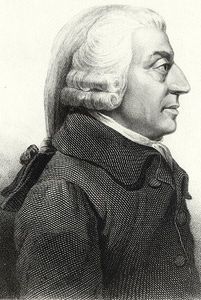Liberty Matters
Stark Demarcation Unhelpful
 My thanks to Brianne Wolf for engaging my painting of Smith, Hume, and Burke as policy liberals and polity conservatives.
My thanks to Brianne Wolf for engaging my painting of Smith, Hume, and Burke as policy liberals and polity conservatives.Brianne treats the polity conservatism. She does not dispute that it is apt to regard each as a polity conservative. But she suggests that "the foundations of their polity conservatism differ" (italics added).
Any two people will differ at least somewhat in their political sensibilities, as they will in other aesthetic domains. Perhaps Burke was somewhat warmer on tradition and custom than Hume, and maybe than Smith too. But uniqueness does not imply large differences. Where Burke faulted the French revolutionists and their British sympathizers for having too little regard for tradition, he was not saying that tradition was all that mattered. He was an active reformer; he favored letting the Americans go their own way. In criticizing French affairs, he was not saying anything that Hume or Smith would have much disagreed with, I think.
Brianne often suggests a foundationalism or demarcationism—and associated lexicographic prioritization—that I am uncomfortable with. Brianne writes:
- "Hume and Smith advocate judgment ahead of patriotism"
- Hume and Smith put "concern for justice and liberty ahead of duty to country"
- "Smith consistently places concern for justice ahead of concern for country"
- "both Hume and Smith advocate a patriotism guided by moral judgment and separated from custom, duty, or tradition"
Smith is quite explicit that moral sentiments are aesthetic. Notice that both Part IV and Part V of TMS treat the beauty of objects, with the second chapters treating "the character and actions of men" (TMS 187) or "moral sentiments" (200). Political sensibilities are aesthetic.
Brianne sees Smith and Hume as alike, and so do I. But that likeness would not "advocate judgment ahead of patriotism." It is not "judgment" versus "patriotism." It is one judgment versus another judgment, with patriotism etc. playing a role in the arriving to each judgment. Brianne quotes Smith on the ability of laborers to arrive at "just judgment" (from WN 782.50). Judgments can be more or less just. Smith's multifaceted justice has within it considerations of patriotism, tradition, and so on—like I noted previously (I quoted Smith on the third source of moral approval, TMS 327.16). And I think Brianne is mistaken when she writes: "For Hume...the antiquity of a law does not matter."
In all of this, is there any reason to see Burke as much different from Smith and Hume? Not as far as I can see. Burke emphasized tradition, custom, and so on because Richard Price, Thomas Paine, the Jacobins, and others did not give those things enough weight and standing in their sensibilities. Burke did not wish to replace judgment with tradition; he wanted to shore up tradition to its proper place within judgment. To do that Burke deployed his genius in waxing poetic, and polemic, about how traditions and institutions provide practical senses of propriety, shared meaning, intelligibility of conduct and character, and coherence of life generally. Polity radicals and polity louts need Burke's schooling.
Likewise, I am uncomfortable when Brianne writes: "The danger for liberty lies in judgment being overwhelmed by emotion." Note that reason and passion is not nearly as simple as the familiar "slave of the passions" quotation from the Treatise (which he disavowed) might lead one to believe. Hume suggested that the activity of reasoning, necessary for rendering a judgment, is a calm passion—a passion (link). One might even contend that he allows that the faculty of reason involves impressions and associated triggerings, or passions, albeit calm ones. In suggesting such, Hume suggests a distinction not so much between reason and passion as one between calm passions and violent passions.
Where Brianne writes that "The danger for liberty lies in judgment being overwhelmed by emotion," I would say that the danger for liberty lies in judgment being overwhelmed by unjust emotions. The flourishing of liberty depends on just emotions. (See here on passion/emotion as sentiment active/passive.) We have some control over our emotions and passions, and we should exercise that control justly.
Copyright and Fair Use Statement
“Liberty Matters” is the copyright of Liberty Fund, Inc. This material is put on line to further the educational goals of Liberty Fund, Inc. These essays and responses may be quoted and otherwise used under “fair use” provisions for educational and academic purposes. To reprint these essays in course booklets requires the prior permission of Liberty Fund, Inc. Please contact oll@libertyfund.org if you have any questions.